How to Stop Drug Addiction

Understanding Drug Addiction
Drug addiction is a chronic brain disease characterized by the compulsive use of drugs despite harmful consequences. It often begins subtly and evolves into a complex condition, affecting not just the individual’s health, but also their relationships, work, and overall quality of life. Understanding the nature of addiction, its triggers, and effective coping strategies is an essential step toward recovery.
Recognizing the Problem
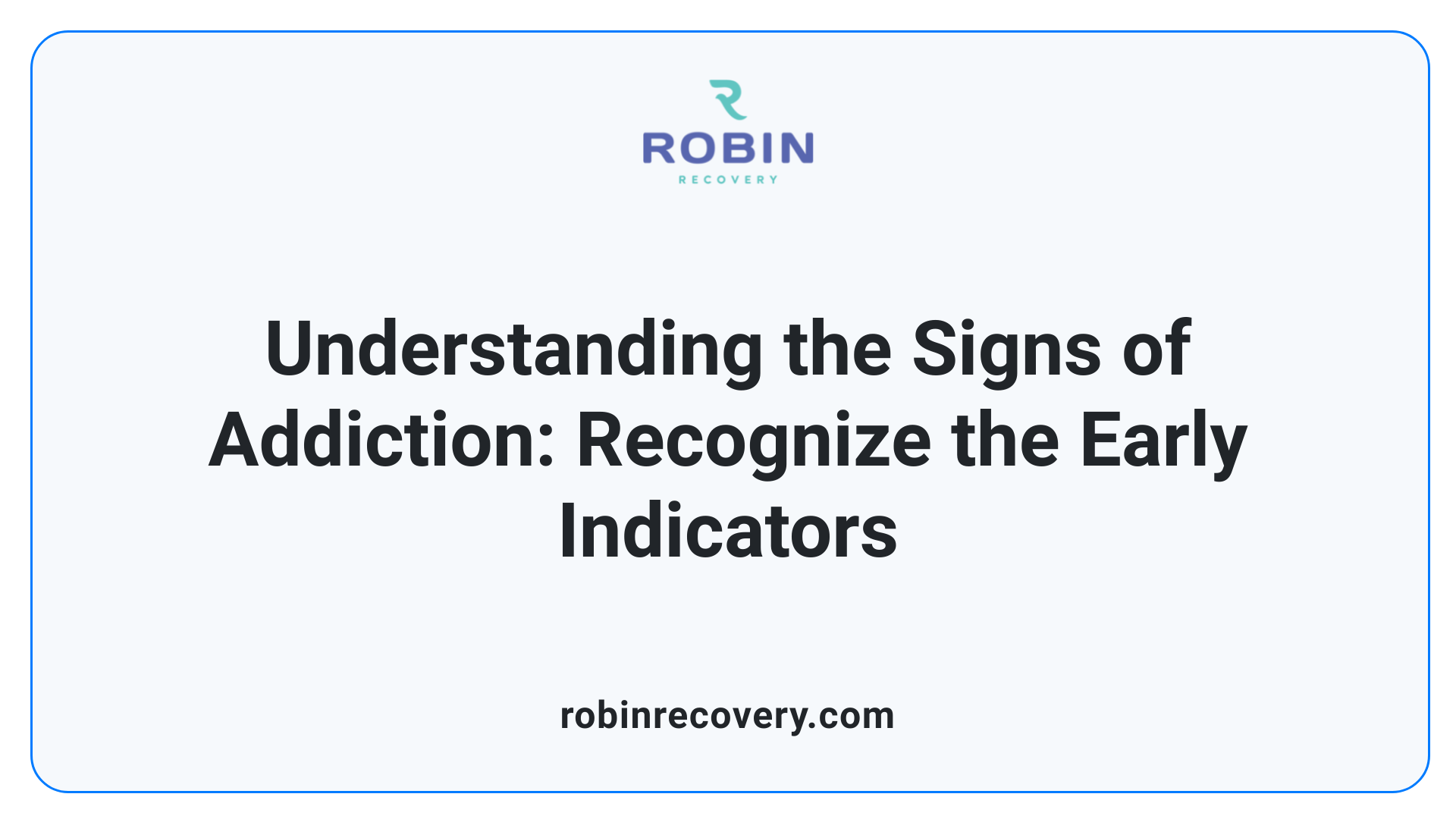
Identifying addiction
Recognizing a drug addiction can be challenging. Signs often include changes in your relationships, neglecting personal care, drastic mood swings, and trouble at work or school. Many individuals may not realize they have a problem until they experience withdrawal symptoms, which can manifest as intense cravings or flu-like symptoms when attempting to quit. Keeping a diary of your drug use can help reveal patterns and triggers connected to your substance use.
Admitting the need for change
The first step to overcoming addiction to drugs is acknowledging that there is a problem. This may involve self-reflective questions about your drug use and its impact on your daily life and relationships. Seeking professional help from a nearby alcohol and drug service or speaking with a local doctor is crucial for managing withdrawal symptoms safely.
Creating a structured quitting plan with specific, achievable short- and long-term goals will guide your recovery. Engage with supportive family and friends, as their encouragement can make a significant difference during this process.
Engaging in healthy activities to replace drug use, identifying personal triggers to avoid, and developing coping strategies for stress are essential components of a successful quitting journey. Remember, seeking help is vital to improving both your physical and mental wellbeing, ultimately enhancing your relationships with others.
Crafting a Plan for Recovery
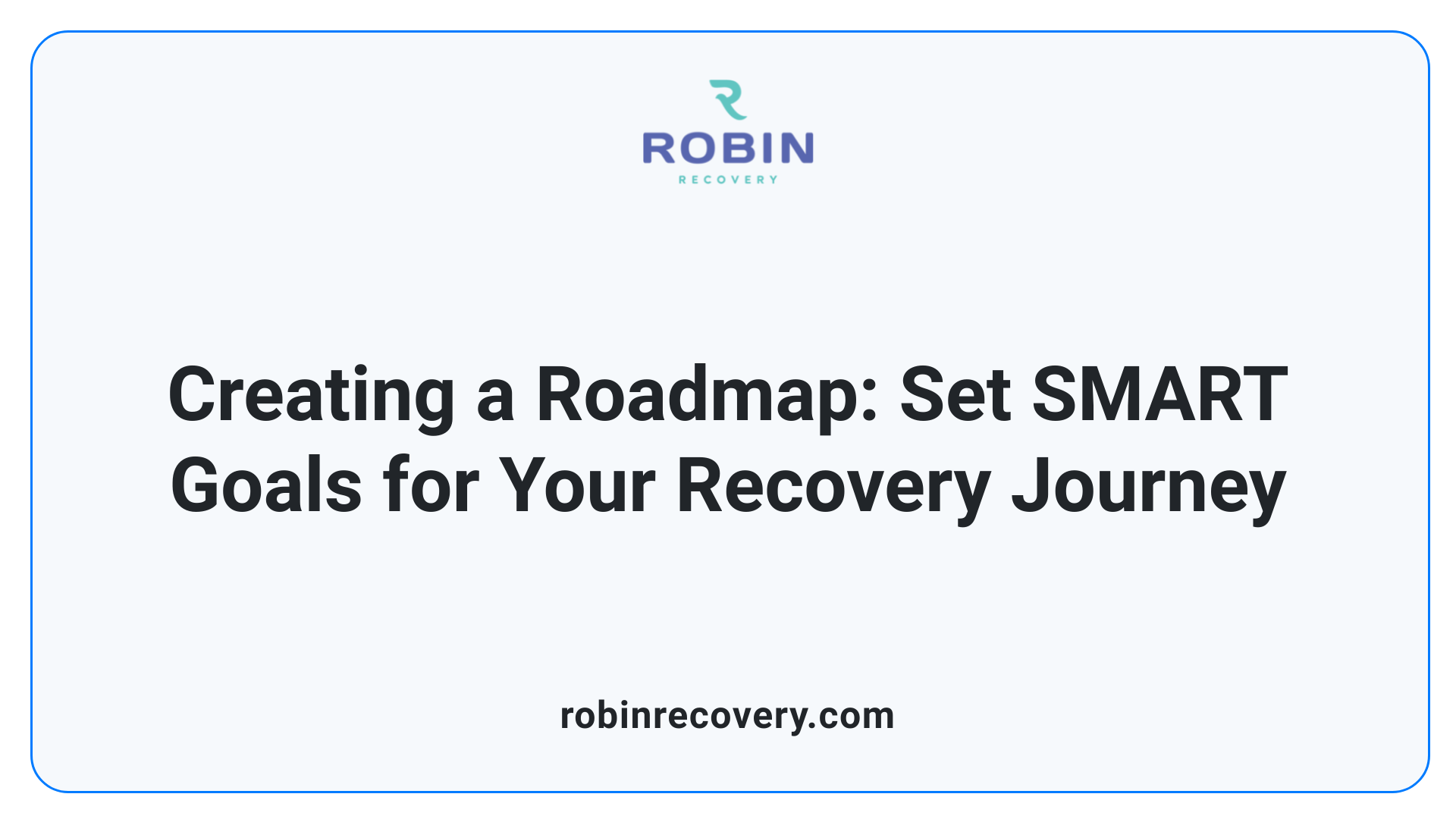
Setting Goals
Creating a structured plan is vital for anyone in recovery from drug addiction. Set SMART goals—Specific, Measurable, Achievable, Relevant, and Time-bound—to provide clarity and direction in your journey. For instance, instead of saying "I want to stop using drugs," frame it as "I will attend three support group meetings weekly for the next month."
Here are some actionable strategies to enhance your plan:
- Short-term goals: Focus on immediate changes, like reducing use and daily engagement with supportive individuals.
- Long-term goals: Aim for sustained sobriety milestones, such as completing a rehab program or remaining drug-free for six months.
- Daily routines: Incorporate healthy habits that replace old patterns, such as exercising or pursuing hobbies you enjoy.
Tracking Progress
Monitoring your recovery progress is essential for maintaining motivation. Keeping a diary can help you identify triggers and patterns related to drug use. Documenting your feelings and cravings will also empower you to develop adaptive strategies.
Using a checklist can make tracking easier:
Date Activity/Goal Achieved Challenges Faced 2023-09-01 Attended a support group Felt nervous about sharing 2023-09-05 Exercised for 30 minutes Cravings were overwhelming at first 2023-09-10 Spent time with supportive friends Avoided old triggers with their help
Additionally, regularly revisiting and adjusting your goals can keep them aligned with your evolving circumstances, reinforcing your commitment to a drug-free life. Moreover, don’t hesitate to reach out to healthcare professionals or local support groups for guidance—this layered support is crucial in facilitating lasting recovery.
Treatment Options and Their Importance
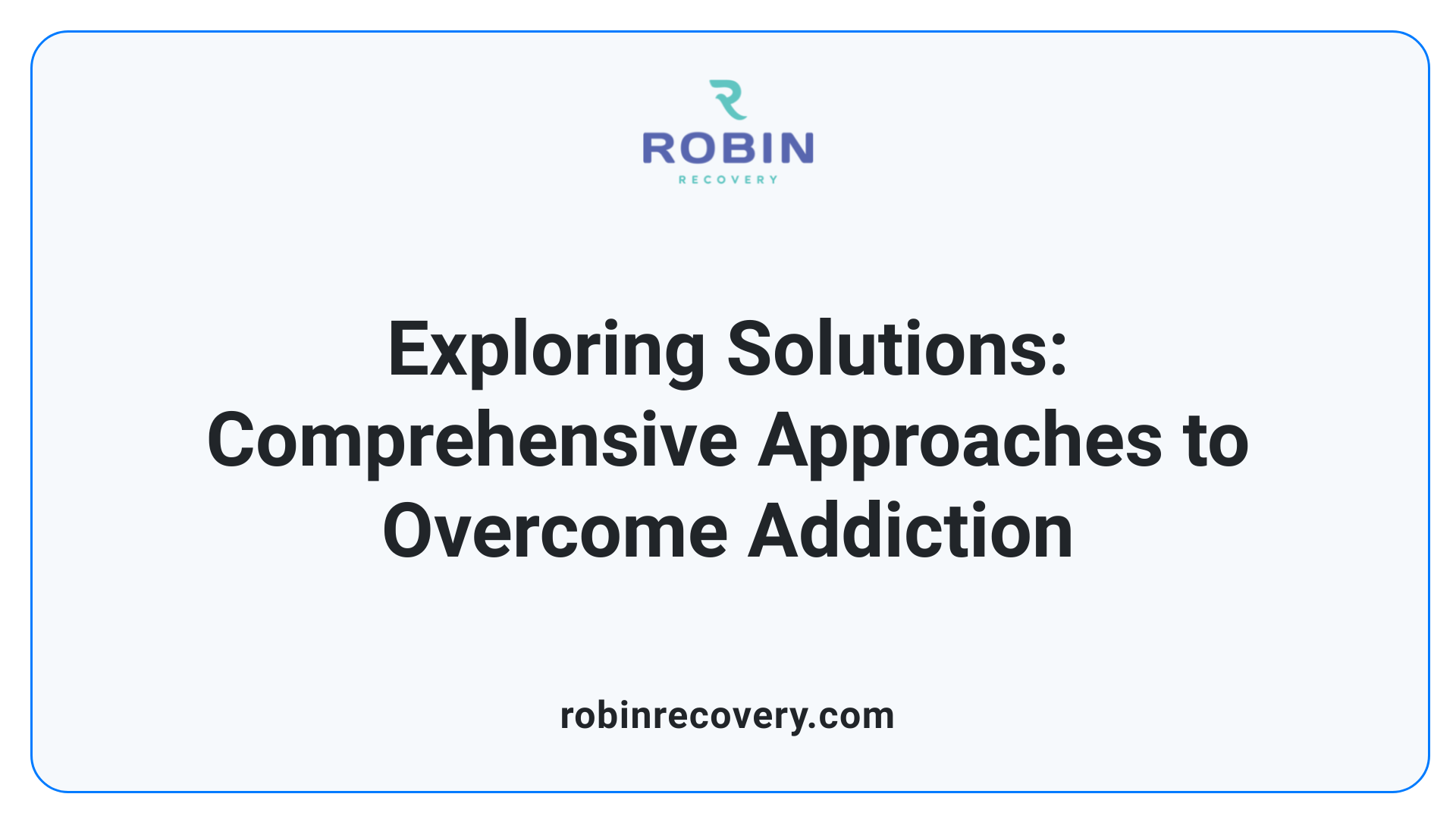
What are the solutions to drug addiction?
Solutions to drug addiction require a comprehensive approach that goes beyond willpower. The first step is acknowledging the problem, which opens the door to exploring a range of treatment options.
Types of Treatment:
- Detoxification: This initial phase helps manage withdrawal symptoms, which vary greatly depending on the drug, duration of use, and the individual's health. Monitoring during detox can be essential, especially for substances like alcohol and benzodiazepines, where withdrawal can be life-threatening.
- Behavioral Counseling: Both individual and group therapy are critical in addressing the psychological aspects of addiction. Techniques like Cognitive Behavioral Therapy (CBT) can help modify attitudes and behaviors related to drug use.
- Medication-Assisted Treatment (MAT): This includes medications that assist with managing withdrawal symptoms and cravings, significantly improving recovery rates.
- Support Groups: Programs like Narcotics Anonymous (NA) provide a community of support, which is vital for long-term recovery.
Personalized Treatment Plans:
A one-size-fits-all approach does not work in addiction treatment. Personalized plans take into account individual factors such as:
- Type of substance used.
- Duration of use.
- Underlying mental health issues.
- Personal triggers and environment.
The Role of Support
It’s crucial to create a support network involving family and friends who encourage recovery. Learning to identify triggers and developing healthy coping strategies can significantly enhance the chances of maintaining sobriety.
Keep in mind that relapse may occur; this does not mean failure but rather an opportunity to reassess and adjust recovery strategies. For immediate help, consider the SAMHSA National Helpline, which provides confidential support and referrals 24/7.
Navigating the Withdrawal Process Safely
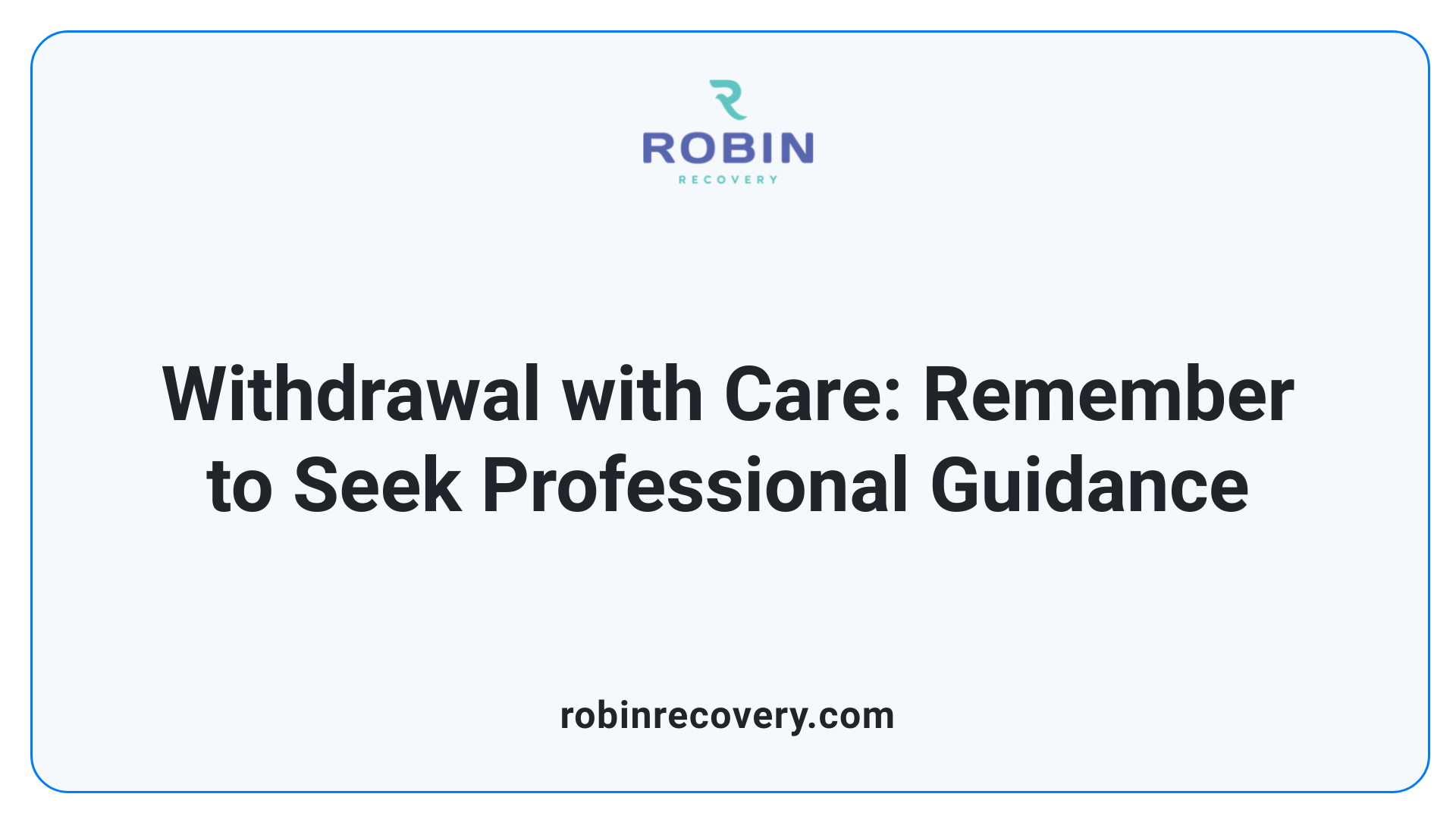
Managing Withdrawal Symptoms
The journey to recovery from drug addiction can be daunting, particularly when it comes to managing withdrawal symptoms. These symptoms can range from mild discomfort to life-threatening conditions, depending on factors such as the type of drug used, duration of use, and individual health conditions. Common withdrawal symptoms include:
- Physical symptoms: nausea, sweating, shaking, and flu-like symptoms.
- Emotional symptoms: anxiety, depression, and intense cravings.
- Neurological symptoms: seizures and disorientation, particularly with substances like alcohol and benzodiazepines.
Recognizing the possible severity of withdrawal highlights the importance of a managed approach. Techniques such as mindfulness, distraction methods, and gradual reduction can help mitigate these symptoms.
Seeking Medical Help
It is crucial to seek medical assistance when planning to quit drugs. Engaging with specialized services ensures a tailored withdrawal plan and monitoring by professionals. Medical support is invaluable, particularly for those facing severe withdrawal symptoms or potential complications. Individuals can contact the SAMHSA National Helpline at 1-800-662-HELP (4357) for 24/7 assistance and local treatment referrals.
Support from healthcare professionals, alongside family and friends, significantly increases the chances of navigating withdrawal successfully. By obtaining guidance and treatment, individuals can reclaim their wellbeing and focus on recovery.
The Role of Support Systems
Family and Friends
Support from family and friends plays a significant role in the journey toward recovery from drug addiction. When individuals feel backed by their loved ones, they often experience an increase in motivation and accountability. Open communication about drug use with trusted family and friends can foster a supportive environment. Friends and family can provide emotional support, encouragement, and help in managing triggers that might lead to relapse.
Professional Support
In addition to social support, seeking assistance from professionals is vital. This includes therapists, counselors, and support groups such as Alcoholics Anonymous and Narcotics Anonymous. Professional treatment programs provide structured approaches that can include counseling, medication-assisted treatments, and detoxification. Services like the SAMHSA National Helpline offer confidential guidance and referrals to local treatment facilities. Professional support ensures that individuals have access to customized care tailored to their unique struggles, enhancing the chances of long-term recovery.
Type of Support Description Impact on Recovery Family & Friends Emotional backing and motivation Increased chance of successful quitting Professional Support Structured treatment and counseling options Enhanced coping strategies and relapse prevention
Coping Strategies for Cravings and Relapses
Managing Triggers
Identifying personal triggers is crucial in the journey to overcome drug addiction. Triggers can include certain social situations, environments, or emotions that prompt cravings for drugs. By acknowledging these triggers, individuals can develop strategies to avoid or cope with them. Techniques such as maintaining a distraction plan, changing environments, engaging in hobbies, or having supportive friends ready to intervene can dissuade relapse.
Tracking substance use in a diary can also empower individuals to recognize patterns in their cravings, enabling them to modify their responses effectively.
Understanding Relapse
Relapse is often a component of recovery; it's important to understand that it doesn't signify failure. Instead, it serves as an opportunity to reassess triggers and modify strategies for quitting. Having a developed plan that includes support systems, continuous treatment, and mindfulness can help individuals manage the ups and downs of recovery. When relapse occurs, reframing the experience as a learning moment can bolster resilience in the face of future challenges.
Support groups and counseling therapies can equip individuals with coping mechanisms, making them more resilient to cravings and less vulnerable to relapse.
Building a Drug-Free Life
New habits and environments
Creating a drug-free life involves establishing new habits and environments that support sobriety. This could mean engaging in regular physical activity, which is known to release endorphins, boosting mood naturally. Finding new hobbies, like painting or gardening, can provide joy and fulfillment that drug use once masked.
Moreover, it's essential to change surroundings that may trigger drug cravings. Removing access to substances and avoiding places or people linked to past use can significantly help in maintaining sobriety. Connecting with supportive groups can provide a sense of belonging and reinforcement of healthy choices.
Mindfulness practices
Incorporating mindfulness practices into daily routines can also enhance mental well-being. Techniques such as meditation, yoga, or breathing exercises help reduce stress and improve self-awareness. These practices enable individuals to deal with cravings more effectively by cultivating patience and acceptance.
Adopting mindfulness can be transformative, providing individuals with tools to navigate triggers and maintain focus on their recovery journey. Finding happiness without drugs is a gradual process, but with dedication to new habits and mindfulness, a fulfilling life in sobriety is entirely achievable.
Resources and Continued Support
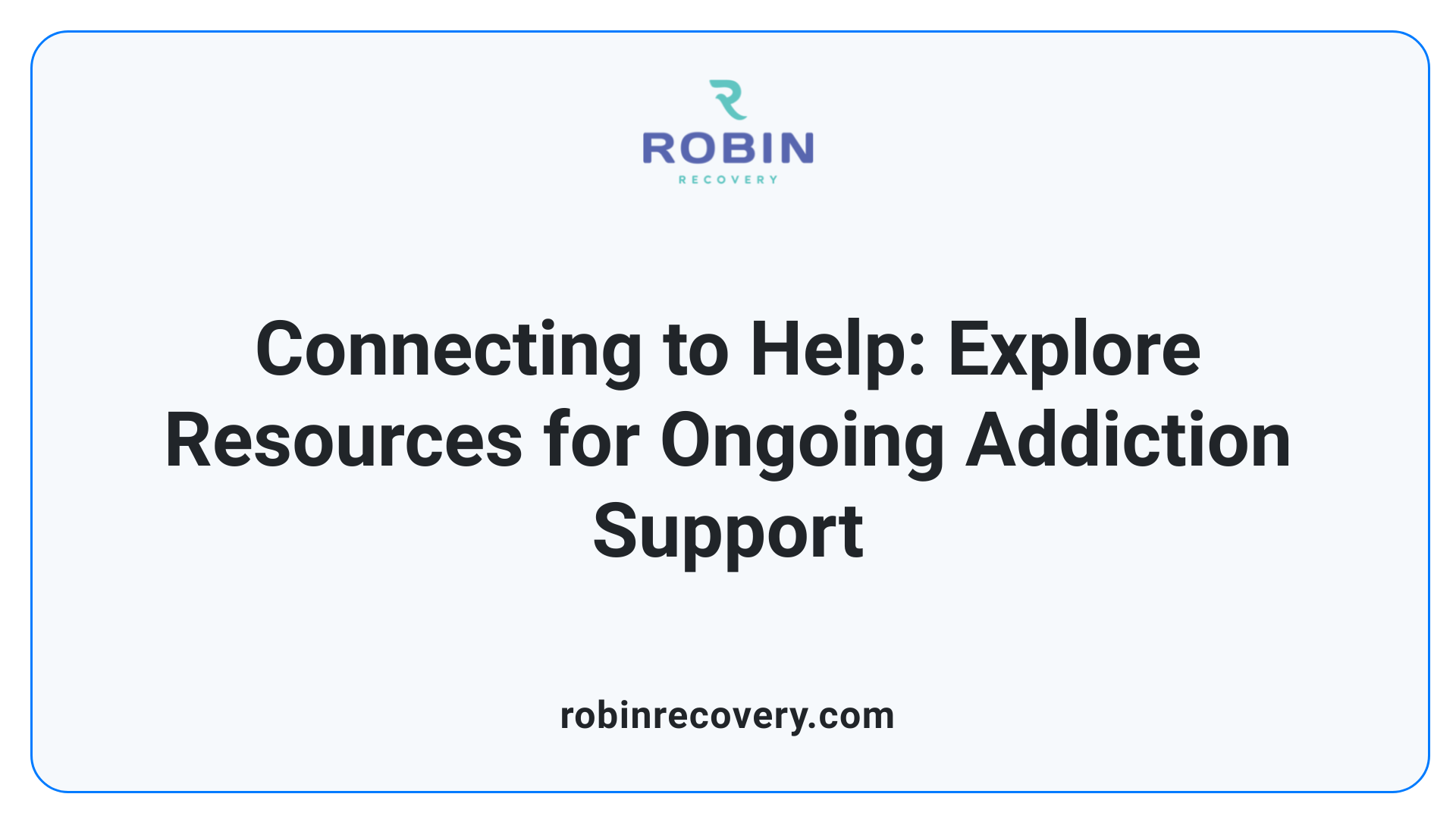
What resources are available for addiction support?
To aid individuals battling drug addiction, various resources are available, one prominent option being SAMHSA’s National Helpline. This free and confidential service operates 24/7 and can be reached at 1-800-662-HELP (4357). It provides referrals to local treatment facilities and support groups, even for those lacking health insurance. The helpline connects callers to trained specialists who can guide them towards appropriate local resources good for their specific needs.
Are there community resources for ongoing support?
Alongside SAMHSA, local communities offer numerous resources aimed at facilitating recovery.
- Support Groups: Organizations like Alcoholics Anonymous (A.A.), Narcotics Anonymous (NA), and Al-Anon provide social support and understanding.
- Counseling Services: Many communities have specialized services focusing on substance use disorders (SUD), offering both individual and group therapy tailored to personal experiences.
- Rehabilitation Programs: Rehab centers often include aftercare services, which are crucial for long-term recovery success.
Resource Type Example Description Helpline SAMHSA’s National Helpline Confidential support and referrals, 24/7. Support Groups Alcoholics Anonymous (A.A.) Peer support for recovery. Counseling Services Local Mental Health Services Professional help addressing addiction-related issues. Rehabilitation Programs Inpatient/Outpatient Facilities Structured care for detox and recovery.
Using these resources can significantly help maintain a supportive environment for those in recovery, creating a pathway back to well-being.
A Lifelong Commitment to Recovery
Overcoming drug addiction is a challenging and ongoing journey that requires a deep commitment to self-improvement, leveraging available resources, and maintaining a supportive network. While setbacks can occur, they are part of the process, and learning from these experiences strengthens your resilience and resolve. Ultimately, with determination, a strategic approach, and continuous support, recovery and a drug-free life are attainable goals.
References
- How to reduce or quit drugs
- SAMHSA's National Helpline
- How to stop taking drugs or reduce your drug use - Change Grow Live
- Overcoming Drug Addiction - HelpGuide.org
- Drug addiction (substance use disorder) - Diagnosis and treatment
- Treatment and Recovery | National Institute on Drug Abuse (NIDA)
- Tips for Preventing Substance Abuse - Student Affairs
- Drug Use and Addiction - MedlinePlus
- How to Break an Addiction: A Guide to Overcoming Addiction
